In the world of fitness and nutrition, protein reigns supreme. It’s the essential building block of muscle, crucial for repair, growth, and overall health. While whey protein often takes center stage due to its rapid absorption, another protein powerhouse deserves equal attention: casein.
Often dubbed the “sleep protein,” casein offers unique benefits, particularly for overnight muscle recovery and growth. This comprehensive guide dives deep into the world of casein protein, exploring its distinct properties, comparing different forms, and highlighting the best products to help you maximize your fitness gains, even while you sleep.
Whether you’re a seasoned athlete or just beginning your fitness journey, understanding the power of casein protein can be a game-changer.
Table of Contents
What is Casein Protein?
Casein is the predominant protein found in milk, making up approximately 80% of its total protein content. It’s a byproduct of cheese production, formed when milk is curdled. Unlike its fast-absorbing counterpart, whey, casein is a slow-digesting protein.
This slow release of amino acids into the bloodstream is what makes it so valuable, especially for pre-sleep consumption. Think of it as a sustained-release fuel for your muscles, providing a steady supply of amino acids throughout the night to prevent muscle breakdown and promote recovery.

Micellar Casein vs. Caseinates: Understanding the Difference
Not all casein is created equal. Two primary forms are commonly found in supplements: micellar casein and caseinates.
- Micellar Casein: This is the natural, unprocessed form of casein found in milk. It forms micelles (small, spherical structures) in the stomach, which contribute to its slow digestion. It is generally considered the preferred form due to its slower absorption rate.
- Caseinates (Sodium, Potassium, or Calcium Caseinates): These are produced through further processing of casein. While still a good source of protein, they are digested more quickly than micellar casein, making them less ideal for pre-sleep consumption.
The difference in digestion rates is key. Micellar casein’s slow and steady release of amino acids makes it particularly effective for preventing muscle protein breakdown (catabolism) during sleep, a period when the body is typically in a fasted state.
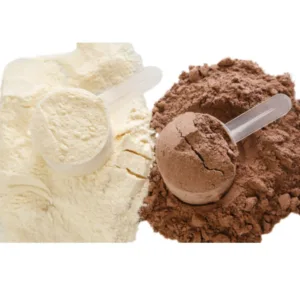
Benefits of Casein Protein:
Casein protein offers a range of benefits, making it a valuable addition to any fitness regimen:
- Overnight Muscle Recovery: The primary benefit of casein is its ability to support muscle protein synthesis and reduce muscle breakdown during sleep. This is crucial for optimizing muscle growth and repair after exercise.
- Satiety and Appetite Control: Casein’s slow digestion can help you feel fuller for longer, which can be beneficial for weight management and controlling cravings.
- Improved Bone Health: Casein is a good source of calcium, an essential mineral for strong bones.
- Potential Metabolic Benefits: Some studies suggest that casein may have positive effects on metabolism.
How to Choose the Best Casein Protein:
Selecting the right casein protein powder can significantly impact its effectiveness. Consider these factors:
- Type of Casein: Prioritize micellar casein for its slow-digesting properties.
- Protein Content: Look for products with a high protein content per serving, ideally 20-30 grams.
- Ingredients: Choose products with minimal ingredients and avoid artificial sweeteners, flavors, and colors.
- Mixability and Texture: Casein can sometimes be a bit thicker than whey, so look for products that mix well and have a smooth texture.
- Taste: While less critical than with whey, taste is still important. Choose flavors you enjoy.
- Price: Casein protein powders can vary in price. Find a product that fits your budget.
- Third-Party Testing: Look for products that have been independently tested for quality and purity.
1. Optimum Nutrition Gold Standard 100% Casein Protein
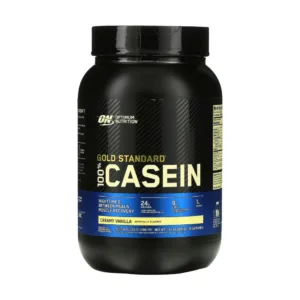
Features:
- 24 grams of protein per serving sourced from 100% micellar casein.
- Slow-digesting protein, making it ideal for muscle recovery during the night.
- Contains 5 grams of BCAAs (Branched-Chain Amino Acids) per serving.
- Gluten-free, making it suitable for individuals with gluten sensitivity.
- Available in a variety of flavors like Chocolate Crème and French Vanilla.
2. Dymatize Elite Casein Protein
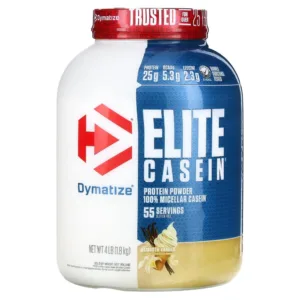
Features:
- 25 grams of protein per serving sourced from micellar casein.
- Slow-digesting protein that keeps you full and supports muscle repair overnight.
- 5 grams of BCAAs per serving for enhanced recovery.
- 2 grams of fat and only 3 grams of carbohydrates per serving.
- Available in flavors like Cinnamon Bun and Cookies & Cream.
3. Bulk Natural Pure Whey Isolate
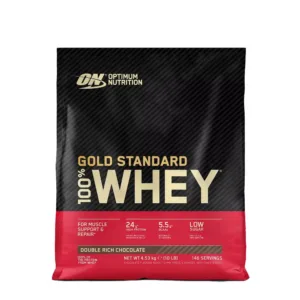
Features:
- 23 grams of protein per serving from high-quality whey isolate.
- Extremely low in fats and carbohydrates, making it ideal for those on a fat-loss regimen.
- Free from artificial flavors, colors, and sweeteners.
- Unflavored version available, providing versatility in recipes.
- Fast-digesting protein that supports muscle growth post-workout.
4. MyProtein Impact Whey Protein
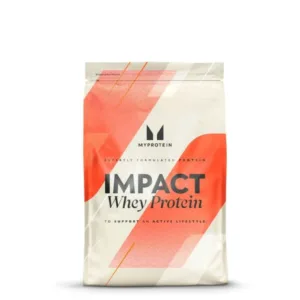
Features:
- 21 grams of protein per serving sourced from whey concentrate.
- Available in over 40 flavors like Chocolate Smooth and Salted Caramel.
- Contains minimal fat and carbs, making it ideal for weight management.
- Instantized for easy mixing in water or milk.
- Rich in essential amino acids (EAAs) for muscle growth and repair.
5. Gold Standard Whey Protein by Optimum Nutrition

Features:
- 24 grams of protein per serving from a blend of whey protein isolates and concentrates.
- Packed with 5.5 grams of BCAAs, which help improve muscle recovery.
- Includes digestive enzymes to promote better digestion and absorption.
- Available in many flavors such as Double Rich Chocolate, Vanilla Ice Cream, and Cookies & Cream.
- Low in fat and sugar, making it suitable for weight management.
6. Vital Proteins Collagen Peptides
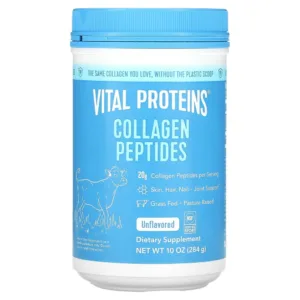
Features:
- 20 grams of collagen per serving, supporting skin, joints, and muscle health.
- Sourced from grass-fed, pasture-raised cows.
- Hydrolyzed for easy digestion and absorption.
- No artificial flavors, sweeteners, or additives.
- Can be added to both hot and cold liquids like coffee or smoothies.
7. Vital Proteins Matcha Collagen Protein
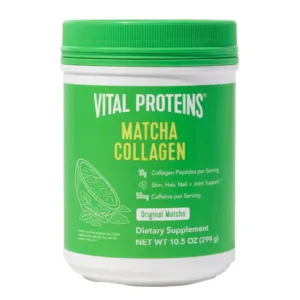
Features:
- 10 grams of collagen per serving combined with matcha for a natural caffeine boost.
- Low in sugar and calories, with only 2 grams of carbs.
- Supports skin elasticity, joint health, and muscle recovery.
- Contains 100 milligrams of caffeine from matcha to enhance focus and energy.
- Gluten-free and dairy-free.
8. MuscleTech NitroTech Whey Protein
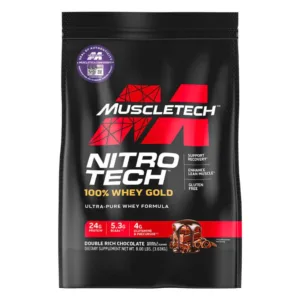
Features:
- 30 grams of protein per serving, sourced from whey protein peptides and isolates.
- Contains 6.8 grams of BCAAs for enhanced recovery.
- 3 grams of creatine monohydrate per serving for muscle strength.
- Includes digestive enzymes to aid digestion.
- Available in flavors like Milk Chocolate and Fudge Brownie.
9. Orgain Organic Protein Powder
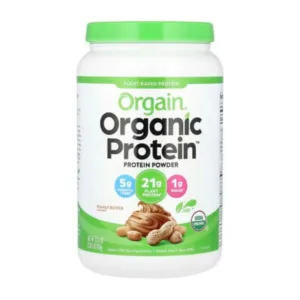
Features:
- 21 grams of plant-based protein per serving from organic pea, brown rice, and chia seeds.
- Free from artificial sweeteners, flavors, and preservatives.
- Contains 5 grams of fiber per serving for digestive support.
- Ideal for vegans, vegetarians, and those with dairy allergies.
- USDA-certified organic ingredients.
10. Perfect Keto Collagen Peptides
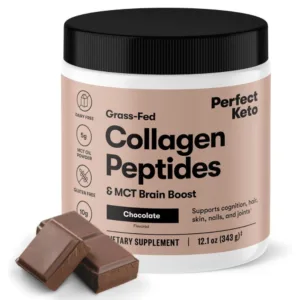
Features:
- 10 grams of collagen per serving, combined with MCT oil powder for added energy.
- Supports joint, skin, hair, and muscle health.
- No sugar, dairy, gluten, or soy.
- Ideal for those following a ketogenic diet.
- Flavored versions are available for easier consumption.
11. Cellucor C4 Original Pre-Workout
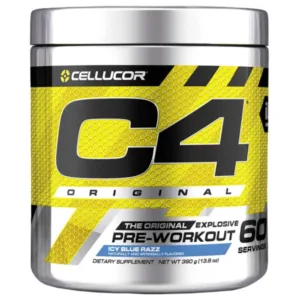
Features:
- 150 milligrams of caffeine per serving for an energy boost.
- 1.6 grams of CarnoSyn Beta-Alanine to improve endurance and reduce fatigue.
- Contains creatine nitrate for increased strength and muscle pumps.
- Includes arginine alpha-ketoglutarate (AAKG) for improved nitric oxide production and blood flow.
- Available in a variety of flavors such as Icy Blue Razz and Fruit Punch.
12. BPI Sports Best BCAA
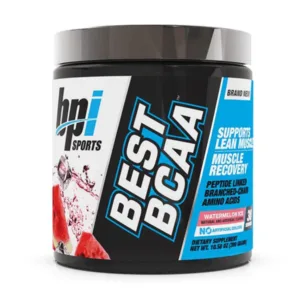
Features:
- 5 grams of BCAAs (branched-chain amino acids) per serving to support muscle recovery and growth.
- Includes 2.5 grams of leucine, which helps trigger muscle protein synthesis.
- Contains electrolytes to keep you hydrated during intense workouts.
- Available in flavors like Watermelon Ice and Peach Mango.
13. Orgain Organic Protein Bar
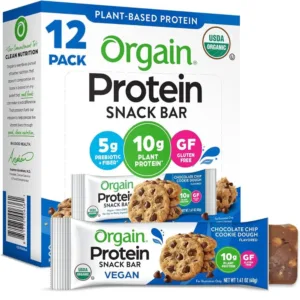
Features:
- 10 grams of plant-based protein per bar.
- Free from gluten, soy, and dairy, making it ideal for people with dietary restrictions.
- Contains organic oats, nuts, and seeds for a wholesome snack.
- No added sugars, artificial flavors, or preservatives.
- Available in flavors such as Chocolate Chip and Peanut Butter Chocolate.
14. Nature’s Best Isopure Zero Carb Protein
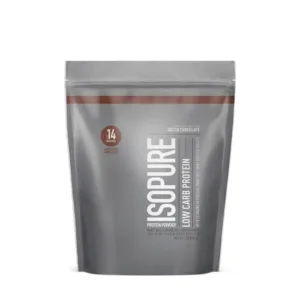
Features:
- 25 grams of protein per serving from 100% whey protein isolate.
- Zero carbs, making it ideal for low-carb and ketogenic diets.
- Contains no fat or sugar, providing a lean protein option.
- 5.5 grams of BCAAs per serving to promote muscle recovery.
- Lactose-free, perfect for those with lactose intolerance.
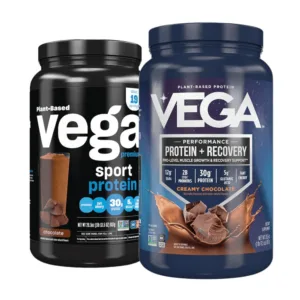
Features:
- 30 grams of plant-based protein per serving from peas, organic pumpkin seeds, organic sunflower seeds, and alfalfa.
- 6 grams of BCAAs to help with muscle recovery.
- Contains added greens (kale, spinach, and broccoli) for additional nutrients.
- No artificial flavors, sweeteners, or preservatives.
- Certified vegan and gluten-free.
16. Garden of Life Sport Organic Plant-Based Protein
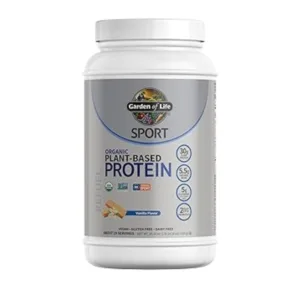
Features:
- 30 grams of organic plant-based protein per serving from peas, sprouted grains, and seeds.
- Contains 5 grams of BCAAs to support muscle recovery.
- No added sugar, dairy, gluten, or soy.
- Certified USDA organic ingredients.
- Supports digestive health with probiotics.
17. Legion Whey+ Protein Powder
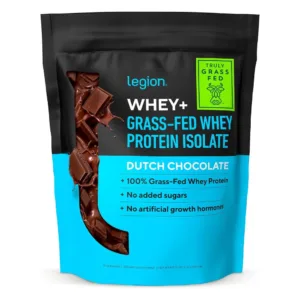
Features:
- 22 grams of whey protein isolate per serving.
- Sourced from grass-fed cows without hormones or antibiotics.
- Naturally sweetened with stevia and no artificial flavors.
- Contains no added sugars, gluten, or soy.
- Includes all essential amino acids for muscle growth and recovery.
18. Klean Athlete Klean Isolate Protein
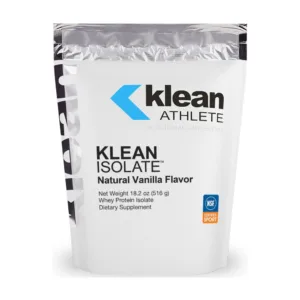
Features:
- 25 grams of whey protein isolate per serving.
- Free from artificial sweeteners, gluten, soy, and GMOs.
- Contains 5.6 grams of BCAAs per serving to support muscle recovery.
- Non-GMO and NSF Certified for Sport.
- Available in flavors such as Chocolate and Vanilla.
19. Evlution Nutrition ENGN Pre-Workout
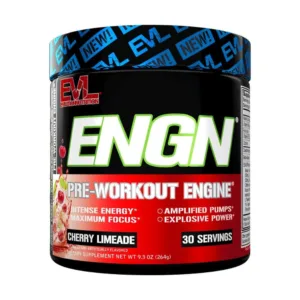
Features:
- 300 milligrams of caffeine per serving for intense energy.
- 6 grams of citrulline for improved blood flow and muscle pumps.
- Includes Beta-Alanine, Creatine Monohydrate, and L-Tyrosine for endurance and focus.
- No artificial colors or dyes.
- Available in flavors like Blue Raz and Sour Green Apple.
20. Nature Valley Crunchy Granola Bars
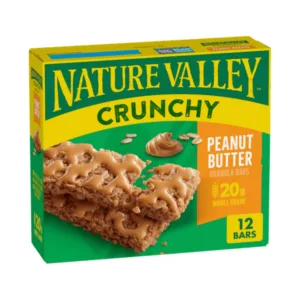
Features:
- 10-12 grams of whole grains per bar.
- Made with simple ingredients like oats, honey, and peanut butter.
- No artificial flavors, colors, or preservatives.
- Available in a variety of flavors, including Peanut Butter, Oats ‘n Honey, and Crunchy Chocolate.
Conclusion
When it comes to fitness and nutrition products, the wide variety of options available can make it difficult to find the right match for your needs. Each product reviewed here has unique features, pros, and cons that cater to different goals and preferences.
Pre-workout supplements like Cellucor C4 Original and EVLution Nutrition ENGN are great choices if you’re looking for an energy boost and increased endurance before a workout. These products contain ingredients like caffeine and Beta-Alanine, which provide mental clarity, reduced fatigue, and enhanced performance. However, users sensitive to stimulants may want to be cautious due to the high caffeine content.
For post-workout recovery, BPI Sports Best BCAA and Nature’s Best Isopure Zero Carb Protein stand out. These supplements support muscle recovery and growth with their high-quality BCAAs and protein isolates. With zero carbs and no added sugars, they are also ideal for those following low-carb or ketogenic diets.
Plant-based protein powders like Vega Sport Premium Protein and Garden of Life Sport Organic Plant-Based Protein are fantastic for those who prefer vegan or dairy-free options. They offer a clean, nutritious formula with added greens and no artificial ingredients. While the texture might not be as smooth as whey-based proteins, these products provide excellent nutritional value and are free from allergens.
Protein bars like Orgain Organic Protein Bar and Nature Valley Crunchy Granola Bars are convenient and wholesome choices for a snack. While they are lower in protein compared to other options, they still provide energy and essential nutrients, making them great for those on the go.
Ultimately, choosing the right product depends on your personal preferences, dietary restrictions, and fitness goals. Whether you’re looking to fuel your workouts with energy-boosting pre-workouts or recover with high-quality protein powders and BCAAs, there are plenty of effective options to suit your needs. Always consider the ingredients, price, and your body’s reaction to different supplements before making a decision.
Questions (FAQs)
Q. What is casein protein and how does it differ from whey protein?
A. Casein is a slow-digesting protein derived from milk. Unlike whey protein, which is absorbed quickly by the body, casein is digested more slowly, providing a sustained release of amino acids. This makes it ideal for consumption before bed or during long periods without food. Whey protein, on the other hand, is faster acting and is typically used for post-workout recovery.
Q. Can I use casein protein if I am lactose intolerant?
While casein is derived from milk, many casein protein powders contain very little lactose, making them tolerable for those with mild lactose intolerance. However, if you are highly sensitive to lactose, it’s best to choose a casein protein that is specifically labeled as “lactose-free” or opt for a plant-based protein alternative.
Q. How do I take casein protein?
Casein protein is typically taken as a shake, mixed with water or milk. The best time to take casein is before bed, as its slow digestion helps feed your muscles overnight. It can also be used as a meal replacement or snack if you need to prolong satiety throughout the day.
Q. Are there any side effects of taking casein protein?
For most people, casein protein is safe to consume. However, some individuals may experience digestive issues, especially if they are lactose intolerant or have a sensitivity to dairy. Additionally, excessive consumption may lead to digestive discomfort, so it’s important to follow recommended serving sizes.
Q.Is casein protein suitable for vegetarians?
Yes, casein protein is suitable for vegetarians as it is derived from milk, which is an animal product. However, it is not suitable for vegans. Those following a vegan diet should consider plant-based protein powders instead.
Q. How long does it take to see results from using casein protein?
Results vary depending on your individual fitness goals and diet. When combined with a proper workout routine, casein protein can help build muscle mass and improve recovery. Some individuals may start seeing results within a few weeks, but significant muscle growth may take a few months.
Q. Can I mix casein protein with other supplements?
Yes, casein can be mixed with other supplements like creatine, BCAAs, or a pre-workout formula, depending on your fitness goals. Be sure to check for any potential ingredient interactions or consult with a healthcare provider before combining multiple supplements.
Q. Is casein protein safe for athletes?
Yes, casein protein is generally safe for athletes. It is NSF Certified for Sport in some brands, meaning it is tested to ensure it doesn’t contain any banned substances. However, athletes should always verify the specific product’s certification to ensure it meets competition standards.
Q. How much casein protein should I take daily?
The recommended daily intake of casein protein is typically between 20 to 40 grams, depending on your body weight, activity level, and fitness goals. It’s best to start with one scoop (usually around 25 grams) per serving and adjust based on your individual protein needs.
Q. Can I bake with casein protein?
Yes, casein protein can be used in baking, as it holds up well under heat. It can be added to recipes like protein pancakes, muffins, and energy bars. Just be mindful that casein is denser than whey protein, so it may alter the texture of baked goods slightly.
Q. Does casein protein help with weight loss?
Casein protein can aid in weight loss by helping to increase feelings of fullness, reducing overall calorie intake. Its slow digestion ensures that you feel satisfied longer, making it a useful tool for those looking to manage their weight. However, it should be combined with a healthy, balanced diet and exercise for optimal results.
Q. What should I look for in a high-quality casein protein powder?
When selecting a casein protein powder, look for the following:
- Micellar casein as the main ingredient, which has the slowest digestion rate.
- Minimal additives and artificial sweeteners.
- Third-party testing for quality and purity.
- Clear labeling of ingredients and nutritional information.
Q. Can I use casein protein for muscle recovery?
Yes, casein protein is an excellent option for muscle recovery, particularly when consumed before bedtime. The slow-digesting nature of casein ensures that your muscles are supplied with a steady stream of amino acids, aiding in repair and growth throughout the night.
Q. Can casein protein replace a meal?
While casein protein is great for maintaining muscle mass and prolonging satiety, it is not a complete meal replacement. It lacks the full range of macronutrients (carbs and fats) and micronutrients (vitamins and minerals) that a balanced meal provides. However, it can be used as a snack or part of a meal when combined with other nutrient-rich foods.
Q. How does casein protein help with sleep?
Since casein digests slowly, it provides a prolonged release of amino acids into the bloodstream, helping to prevent muscle breakdown during sleep. This makes it an excellent supplement for individuals looking to optimize muscle repair during the night. Some people also find that it helps them feel full and avoid nighttime hunger pangs.
Q. Is casein protein better than whey for muscle building?
Both casein and whey protein are effective for muscle building, but they work in different ways. Whey protein is faster-absorbing, making it ideal for post-workout recovery when your muscles need quick nourishment. Casein, on the other hand, provides a sustained release of protein, making it better suited for overnight muscle recovery. Combining both types can give you the benefits of quick and prolonged muscle repair.

Leave a Reply